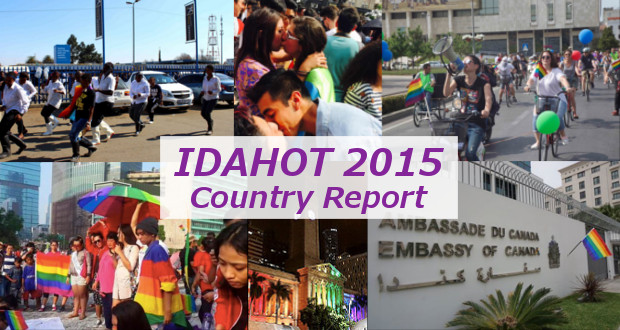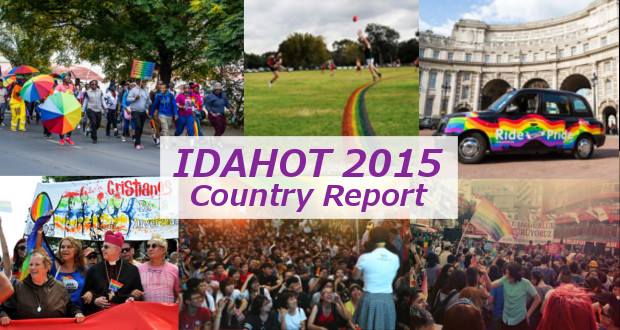UNESCO Beijing continues to do good work in China by supporting the rights of LGBTI individuals throughout the country. This year, in partnership with lesbian rights group Common Language, the group have launched the ‘Be Myself’ campaign aimed at raising public awareness on the issues facing young LGBTI people.
[box type=”note” ]We are still busy collecting information on this year’s IDAHOT activities and are waiting to hear back from activists and event organisers. If you have information to share with us, please write us at contact@dayagainsthomophobia.org[/box]
 The campaign is calling for people to share images of themselves alongside anything rainbow-colored and a message of support in order to improve public perceptions of LGBTI youth. The online Rainbow Challenge was started as part of UNESCO regional IDAHOT activities on April 2.
The campaign is calling for people to share images of themselves alongside anything rainbow-colored and a message of support in order to improve public perceptions of LGBTI youth. The online Rainbow Challenge was started as part of UNESCO regional IDAHOT activities on April 2.
People sent and shared the picture with the message on Sina Weibo, @ two other friends, # Rainbow Challenge #, @UNESCO Beijing Office.
Friday, May 15
GaySpot Magazine invited everyone to spend Friday afternoon at their event Face@Face: A Chinese & Western Gay Portrait Exhibition, at the Embassy of the Kingdom of the Netherlands. The exhibition displayed work of two young photographers from Xinjiang, who recorded over 30 volunteer subjects for a moving portrait and video documentary.
The event included the first exhibition of portraits, presentation by the Dutch embassy representatives, a Documentary world premiere, Q&A session and Free talk with drinks.
Announcement on Dutch Embassy page:
Promoting equality
Gayspot has considerable experience in promoting equality for LGBT-persons. The organisation has been publishing an LGBT-magazine for years and created apps for LGBT-persons to express themselves, share information on domestic and international movements promoting LGBT-rights, sexual health and self-acceptation and get information on activities and events organised by the Chinese LGBT-community.
Gayspot has found that homophobia and discrimination is often founded in unfamiliarity. The portrait exhibition that was opened at the embassy, will create a visual impact to the public and lets the public get in touch with the LGBT-community and feel there is no difference between LGBT-persons and other persons. The photographs were taken by a young LGBT-photographer in the West of China. Gayspot has also produced a short documentary about the making of these photographs that was also presented at the opening event.
Free & Equal
First secretary of the embassy, Remy Cristini, stressed in his opening speech that the human rights policy of the Netherlands aims at equal rights and equal opportunities for everybody, regardless of sexual orientation or gender identity. As Remy Cristini said: “LGBT people are also students, teachers, taxi drivers or diplomats. They are sons and daughters, neighbours and colleagues. They should have the freedom to be themselves and be treated as equals.”
Beijing saw two film screenings in commemoration of IDAHOT. You can find more details also on City Weekend China.
Sunday, May 17
In Beijing, the Crossroads Center hosted a film screening of Pride in cooperation with the British embassy, followed up by a Q&A with Fan Popo, a filmmaker and LGBT activist. The film was screened in English with Chinese subtitles, and the discussion afterwards was bilingual.
The 2014 British film Pride follows a group of London based LGBT activists raising money to support mining communities who are on strike under the rule of Thatcher in 1984. Initially rebuffed by the Union, the group identifies a tiny mining village in Wales and sets off to make their donation to the village in person. As the strike drags on, the two groups discover that standing together makes for the strongest union of all.

Monday, May 18
Alternatively, on Monday at 6.30pm, the Beijing American Center presented Boys Don’t Cry, an LGBT-themed film starring Hilary Swank based on the real-life story of Brandon Teena, a transgender man who is beaten, raped, and murdered by his male acquaintances after they find out he is anatomically a female.
For more information, check out the center’s Douban page. Alternatively follow the US Embassy on WeChat (ID: USEmbassyChina).
Ambassador Baucus commemorates the International Day Against Homophobia and Transphobia
On Sunday, we marked the International Day Against Homophobia and Transphobia (IDAHOT). IDAHOT is a day to celebrate the advances we’ve made toward equality and justice for our lesbian, gay, bisexual, and transgender neighbors, family members, co-workers, and fellow citizens. It is also a day to examine the steps we can take to end discrimination and to commit ourselves to that work.
In the Senate, I was proud to support the passage of meaningful hate crimes legislation that is now law. Our bill sent a clear message to everyone that the civil rights of all Americans matter. I was also proud to help lead the effort to reauthorize the Violence Against Women Act, which also extended legal protections to same-sex couples.
Despite these and other advances, a number of governments around the world have proposed or enacted laws that aim to curb rights for LGBT organizations, making it difficult for them to find support — and for their voices to be heard.
IDAHOT is an important day and an important reminder of the work still remaining to ensure none of us face discrimination or the threat of violence just because of who we are. Let’s all work together to end this intolerance.
To mark the International Day against Homophobia, Transphobia and Biphobia, the United Nations Development Programme (UNDP) and the United Nations Educational, Scientific and Cultural Organization (UNESCO) held a conference at the United Nation headquarters in Beijing to discuss how to tackle discrimination and violence against LGBTQI youth in China. A presentation of findings from research into homophobic bullying in schools by experts from Beijing Normal University was followed by a panel discussion.
The event also launched the new video of the United Nations “Free and Equal” campaign, mobilizing UN Member States to protect sexual and gender minorities worldwide. In order to transform China into a more inclusive society, UNDP and UNESCO will organize later this year a national consultation to find practical ways to support change within the education sector in China.

In Hangzhou, the “Hangzhou Sunflower” team went on a rainbow bike ride through the city.“Express your love, find the strength to be yourself!” They walked around the West Lake draped in rainbow flags.

The “Guangzhou girls’ team” held a conference about stigma in textbooks, to share experience and fight against homophobic content in school textbooks.
“China AIDS Walk” held the 32nd International AIDS Candlelight Memorial event in Beijing. This year’s motto was: “Go forward hand in hand, supporting the future!”

On May 18th, 2015, a group of university students in Beijing wore black face masks that showed the words “Same Love”, in order to oppose the discrimination towards sexual minorities, to advocate for gender equality and gender diversity and to promote more inclusiveness and respect on campus.


